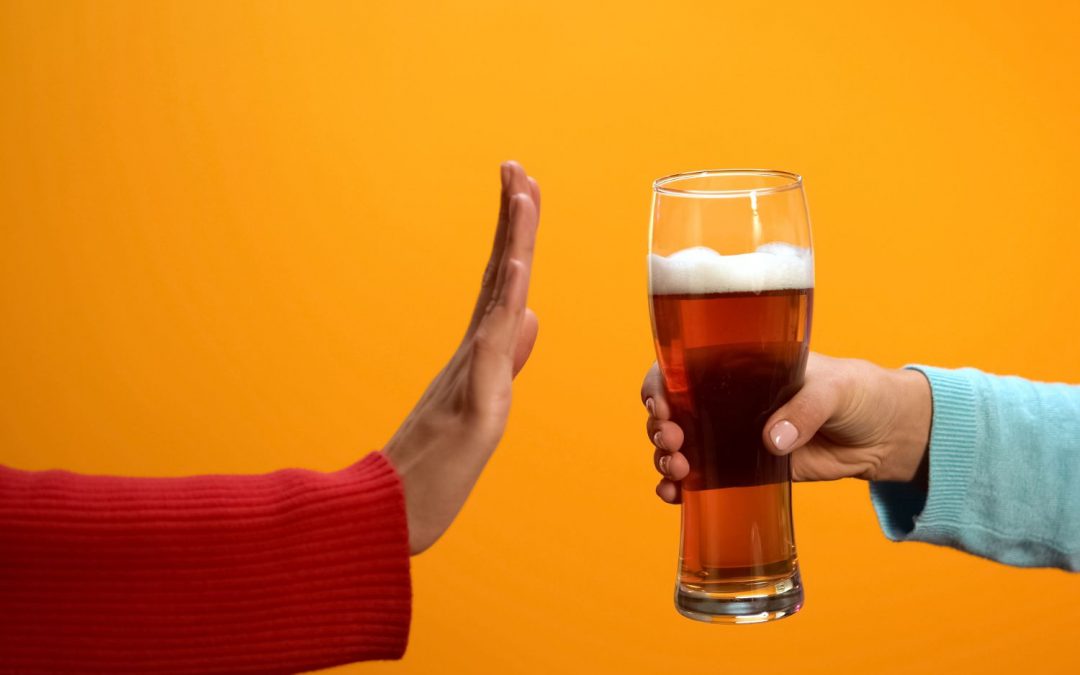Let’s raise a glass to your good health – but let’s make the contents of that glass alcohol-free. For many years, it was widely accepted that moderate alcohol use was actually healthy, in the absence of alcohol dependency or health problems exacerbated by alcohol. But new research now suggests that even small amounts of alcohol can have adverse effects on your health. The growing legions of the sober-curious report increased well-being, lower rates of depression, and better sleep.
Fortunately, it’s easier than ever to adopt an alcohol-free lifestyle as more people take a break from drinking. From 2020 to 2021, sales of non-alcoholic spirits grew 113.4%, NA beer 31.7%, and NA wines 39.4%. Industry experts say that the non-alcoholic drinks category will grow to an impressive $30 billion by 2025!
The Effects of Alcohol on Your Health
We’re all aware excessive drinking isn’t good for your health: Cirrhosis and accidents from driving under the influence are two well-known examples. However, a landmark 2022 study identified an astonishing 58 causes of death due to alcohol. In examining excess-death data, researchers determined that one in eight deaths of people between 20 and 64 is related to alcohol consumption.
Alcohol can impact almost every aspect of your health. Alcohol consumption can lead to:
- Weight gain
- Insomnia
- Depression
- Memory problems
- A weakened immune system
- Pancreatitis
- Diabetes complications
- Lower bone density
- Hearing loss
- Poor skin quality
- Psoriasis
- Atrial fibrillation
- An increased risk of heart attack, atrial fibrillation, and stroke
- An increased risk of neck, esophagus, liver, colon, breast and rectal cancer
Some of the effects are immediate: After binge drinking, you’re more than twice as likely to have a cardiac event. And some of the damage from alcohol develops over the long term. Alcohol can impede your body’s ability to absorb nutrients, which can more gradually erode your health.
9 Benefits of Going Alcohol-Free
When you make the commitment to abstain from alcohol, you’ll likely start noticing positive changes within just a few days.
1 – Exploring Healthy Coping Mechanisms
One major factor in this transformation is recognizing the role alcohol plays in your life, especially as a coping mechanism for stress. By choosing not to drink, you open the door to discovering more productive and healthier ways to relieve stress. This newfound clarity may also prompt self-reflection, as you realize the situations where you relied on alcohol as a crutch.
2 – Improved Brain Health
Research reveals that your brain can begin repairing structural damages caused by alcohol shortly after you stop drinking. This means that by taking this step towards an alcohol-free lifestyle, you are giving your brain the opportunity to heal and restore its normal functions.
3 – Sleep Quality
While it may seem like alcohol helps you fall asleep faster, it actually disrupts your sleep patterns, causing you to wake up after a short while and experience restless sleep. By cutting out alcohol, you can finally enjoy uninterrupted nights of sleep, leading to more energy and alertness during the day.
4 – Reduced Inflammation
Alcohol is known to trigger inflammation in the digestive tract, which can lead to various digestive issues. Chronic alcohol consumption can damage the delicate lining of the intestines, causing leaky gut syndrome, where the intestinal barrier becomes permeable, allowing toxins and bacteria to leak into the bloodstream. Cutting out alcohol helps to reduce inflammation and allows the gut to heal.
5 – Balanced Gut Microbiome
The gut is home to trillions of microorganisms collectively known as the gut microbiome. Alcohol consumption can disrupt the balance of these beneficial bacteria, leading to dysbiosis (an imbalance of gut flora). By eliminating alcohol, you create a healthier environment for these microbes to flourish, promoting better digestion and nutrient absorption.
6 – Improved Nutrient Absorption
Alcohol interferes with the absorption of essential nutrients, including vitamins and minerals, in the intestines. Over time, this can lead to nutritional deficiencies. By giving up alcohol, the gut lining can heal, and the absorption of nutrients can be restored, ensuring your body gets the vital elements it needs to function optimally.
7 – Better Bowel Movements
Alcohol can irritate the digestive tract and lead to irregular bowel movements, including diarrhea and constipation. Removing alcohol from your diet can help regulate bowel movements and promote smoother digestion.
8 – Enhanced Liver Function
The liver plays a crucial role in metabolizing alcohol, and excessive alcohol consumption can strain the liver and lead to conditions like fatty liver and liver inflammation. By quitting alcohol, you give your liver a chance to recover and function more efficiently, which positively impacts digestion and overall health.
9 – Weight Management
Alcohol is calorie-dense and can contribute to weight gain when consumed regularly. Excessive weight gain, particularly around the abdominal area, can lead to digestive issues and an increased risk of gastrointestinal disorders. By cutting out alcohol, you may find it easier to maintain a healthy weight, reducing the burden on your digestive system.
Strategies for Going Alcohol-Free
Eliminating alcohol is a very personal process. For some people, it’s simply a matter of stopping – then feeling motivated by the positive changes they experience to continue. Others, however, may find it more difficult.
If you experience physical withdrawal symptoms, it’s important to talk to a healthcare professional. If you start to realize that alcohol is more important to you than you realized and struggle to stop drinking, consider an organization like Alcoholics Anonymous.
Some helpful actions you can take include:
- Rally your support team. You’ll have an easier time if the people in your life understand why you want to quit drinking. Be aware of people who are uncomfortable with the idea, whether it’s because it makes them more conscious of their own drinking or if they don’t like to drink alone. Your own health is the most important thing.
- Be aware of triggering situations. If you always enjoy a beer at the ball game or after an activity, come up with an alternative strategy before the event. If you turn to a glass of wine after a hard day, look into other activities that help you unwind.
- Practice saying no. You don’t have to dive into details. A simple “no thank you” when offered a drink should always suffice.
Alcohol Alternatives
“Mocktails” are enjoying a renaissance right now, with lots of tasty alcohol-free beverages hitting the market. Some cities even have super-trendy alcohol-free bars and lounges.
Look for products with fewer than 15 grams of sugar. Keep an open mind when you try something new – a mocktail should be enjoyed on its own merits, not on how closely it resembles an alcoholic counterpart.
One healthier alternative to alcohol that is gaining popularity is gut-friendly kombucha! Kombucha has natural probiotics, and low sugar content, and comes in a variety of flavors. But if you’re very sensitive to alcohol or trying to truly go cold turkey, be aware that some alcohol substitutes, including kombucha, contain small amounts of alcohol.
There are many reasons to explore a sober-curious lifestyle, or even just cut down on alcohol consumption for a while to see how you feel.
Sources
Forbes, “As The Non-Alcoholic Category Continues To Grow, Booze–Free Beer Will Be The Space To Watch, https://www.forbes.com/sites/katedingwall/2022/02/28/as-the-non-alcoholic-category-continues-to-grow-boozefree-beer-will-be-the-space-to-watch
Esser MB, Leung G, Sherk A, et al. Estimated Deaths Attributable to Excessive Alcohol Use Among US Adults Aged 20 to 64 Years, 2015 to 2019. JAMA Netw Open. 2022;5(11):e2239485. doi:10.1001/jamanetworkopen.2022.39485
Nelson DE, Jarman DW, Rehm J, Greenfield TK, Rey G, Kerr WC, Miller P, Shield KD, Ye Y, Naimi TS. Alcohol-attributable cancer deaths and years of potential life lost in the United States. Am J Public Health. 2013 Apr;103(4):641-8. doi: 10.2105/AJPH.2012.301199. Epub 2013 Feb 14. PMID: 23409916; PMCID: PMC3673233.
Colrain IM, Nicholas CL, Baker FC. Alcohol and the sleeping brain. Handb Clin Neurol. 2014;125:415-31. doi: 10.1016/B978-0-444-62619-6.00024-0. PMID: 25307588; PMCID: PMC5821259.
Al-Jefri K, Newbury-Birch D, Muirhead CR, et al. High prevalence of alcohol use disorders in patients with inflammatory skin diseases. Br J Dermatol. 2017;177(3):837-844. doi:10.1111/bjd.15497
National Institute on Alcohol and addition, “Neuroscience: the brain in addition and recovery” https://www.niaaa.nih.gov/health-professionals-communities/core-resource- on-alcohol/neuroscience-brain-addiction-and-recovery#pub-toc2
Chan M, Sy H, Finley J, Robertson J, Brown PN. Determination of Ethanol Content in Kombucha Using Headspace Gas Chromatography with Mass Spectrometry Detection: Single-Laboratory Validation. J AOAC Int. 2021 Mar 5;104(1):122-128. doi: 10.1093/jaoacint/qsaa094. PMID: 33099632; PMCID: PMC8372040.



